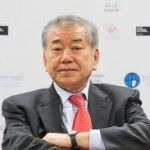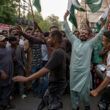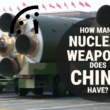North Korea: Don’t dream the impossible
By Andrei Lankov |
In January, Pyongyang proudly announced that it had successfully conducted a fourth nuclear test. This time, the North Koreans claimed, they had tested a thermonuclear device. Observers are skeptical.
Thermonuclear or not, the test was a reminder of an unpleasant fact: North Korea, in defiance of the international community and despite significant pressure, has developed nuclear devices. It is working hard to acquire deployable nuclear weapons and delivery systems. This represents arguably the most serious challenge to the nonproliferation regime in decades—and the peculiarities of the North Korean situation mean that the challenge can be only mitigated, not neutralized.
Hard and soft. The US position regarding North Korea's nuclear program, and indeed the position of the entire international community, is simple: Nothing but "complete, verifiable, and irreversible denuclearization" will do. Unfortunately, this demand is hopelessly unrealistic. North Korean decision makers have valid reasons for believing they should retain their nuclear weapons no matter what. And the world is utterly lacking in means to undermine that belief.
To start with, North Korea is a small dictatorship, run by a hereditary elite, and surrounded by hostile, richer neighbors. Domestically, the country's leaders face a latent threat of popular rebellion; internationally, they are afraid of a US attack. Their problems are exacerbated by South Korea, whose existence makes possible a "German scenario"—that is, regime collapse followed by absorption of the entire country into a much richer neighbor. Ordinary North Koreans might welcome such an eventuality, as a majority of East Germans once did. But for the ruling elite, it would mean losing power and perhaps paying a price for the gross human rights abuses of the past decades. Thus the North Korean government believes it needs a deterrent that can prevent both a foreign invasion (Iraq style) and foreign support for an internal rebellion (Libya style). Nuclear weapons are the only such deterrent.
So far, attempts to achieve the Holy Grail of denuclearization have followed two lines. The soft line is essentially to purchase North Korea's weapons—to exchange economic benefits for Pyongyang's nuclear program. The hard line involves sanctions—making life more difficult for the North Korean people, generating internal pressure for a change in policy, and thus pushing North Korea toward denuclearization.
Attempts to bribe North Koreans into denuclearization are hopeless. Recent history has taught North Korea's rulers that they should not trust outsiders' sweet promises. North Koreans remember that the only dictator who ever exchanged his nuclear weapons acquisition program for promises of economic aid was Libya's Muammar Qaddafi, who paid for that decision with his life. They also remember that Ukraine agreed in 1994 to the removal of the nuclear warheads it had inherited from the Soviet Union. Ukraine did so in exchange for a Russian, British, and US guarantee of territorial integrity, a guarantee hardly worth the paper it was printed on. North Korean diplomats also know the sorry fate of Iraq's Saddam Hussein—and they keep saying that the only reason he was overthrown and killed was that he lacked nuclear weapons. North Korea's leaders believe that, without nuclear weapons, they will become dangerously vulnerable. For them, losing power doesn't mean writing memoirs in the south of France. It means prison time—or an appointment with a lamppost.
Attempts to achieve denuclearization through sanctions are equally hopeless. Sanctions work in an indirect way, by making life within a country difficult for both common people and the elite. Unhappiness about material difficulties causes people to exert pressure on the government and to demand revisions in the policies that have provoked international sanctions. In democratic or semi-democratic states, such popular pressure can be exerted through elections. In less liberal societies, a revolution or a coup is always possible.
But the sanctions effort against North Korea has been quietly sabotaged by China. Chinese diplomats, though they are unhappy about North Korea's nuclear ambitions and brinksmanship, still have valid reasons to prefer the status quo of a relatively stable but divided Korean Peninsula. Even if China changes its approach—which, in fact, might be happening right now—it is still doubtful that sanctions would change Pyongyang's stance on nuclear weapons. Even if sanctions ruined the North Korean economy, which has recently experienced something of a recovery, sanctions would still be unlikely to deliver the desired political results. Even if sanctions provoked a massive famine, they would be unlikely to deliver those results.
This is because the North Korean people simply have no way to influence government policy. They are docile and terrified. They live in a country where the ratio of prisoners to the general population is roughly the same as it was in Joseph Stalin's Russia. They live in a country whose elections are known the world over for delivering a "100 percent approval rate" to government candidates, and for doing so since 1957.
Members of the North Korean elite, meanwhile, have good reasons to avoid staging a coup. Even a successful coup would provoke instability, which in turn would make revolution possible. A revolution, followed by unification, would see the entire elite removed from power and perhaps even forced to pay a price for their wrongdoing. The elite perceives no benefit in rocking the boat—no matter how much they miss their favorite Hennessy cognac.
Stop wasting time. Unfortunately, US and UN policy tends to oscillate between the hard line and the soft line. Neither is going to work. Pursuing the impossible goal of denuclearization can even be considered dangerous because it wastes time that could be spent pursuing the far more realistic goal of freezing North Korea's nuclear potential. A freeze would come at a price, of course—North Koreans do nothing for free. North Korea would halt its nuclear program and refrain from testing nuclear weapons or conducting missile launches. But, essentially for deterrence purposes, it would retain the technology and hardware it has amassed already. In exchange, the United States and the international community would make numerous political concessions and perhaps provide substantial aid.
This compromise may sound unfair. But unlike the dream of denuclearization, it is realistic. Unfortunately, the world still chases what's impossible, switching from the hard line to the soft line and back again—while the North Koreans stay busy making more and better nuclear weapons.
















